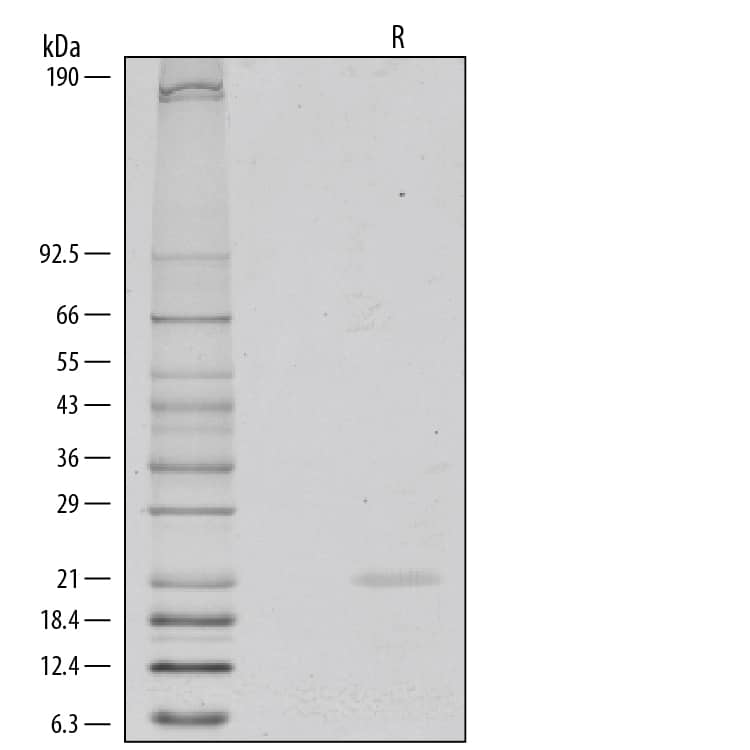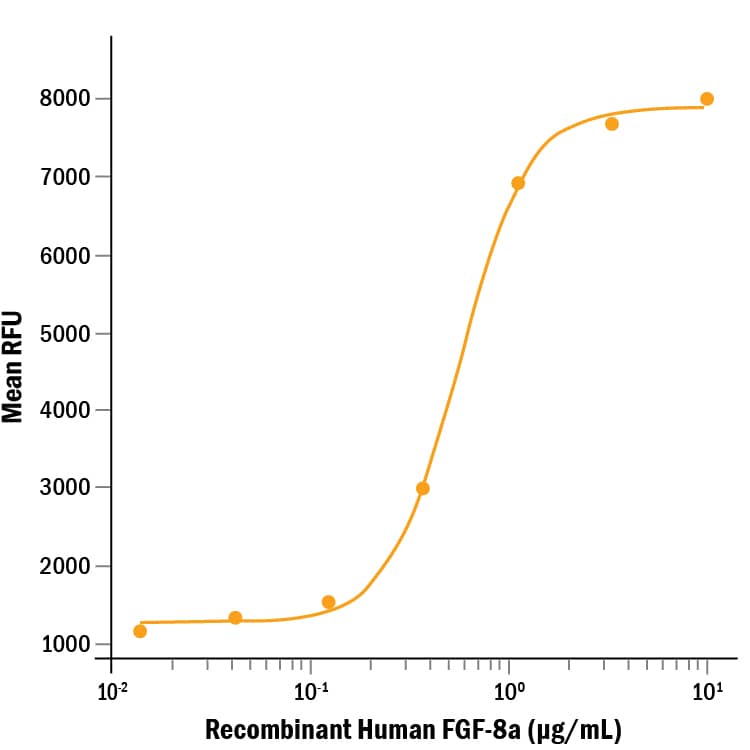Recombinant Human FGF-8a Protein, CF Best Seller
R&D Systems, part of Bio-Techne | Catalog # 4745-F8

Key Product Details
Product Specifications
Source
Gln23-Arg204, with an N-terminal Met
Purity
Endotoxin Level
N-terminal Sequence Analysis
Predicted Molecular Mass
Activity
The ED50 for this effect is 0.25-1.5 μg/mL in the presence of 10 µg/mL heparin.
Scientific Data Images for Recombinant Human FGF-8a Protein, CF
Recombinant Human FGF-8a Protein Bioactivity
Recombinant Human FGF-8a (Catalog # 4745-F8) stimulates cell proliferation of the NR6R‑3T3 mouse fibroblast cell line. The ED50 for this effect is 0.25-1.5 μg/mL in the presence of 10 μg/mL heparin.Recombinant Human FGF-8a Protein SDS-PAGE
1 μg/lane of Recombinant Human FGF-8a was resolved with SDS-PAGE under reducing (R) conditions and visualized by silver staining, showing a single band at 22 kDa.Formulation, Preparation and Storage
4745-F8
| Formulation | Lyophilized from a 0.2 μm filtered solution in MOPS, Na2SO4, and EDTA. |
| Reconstitution |
Reconstitute at 500 μg/mL in sterile PBS.
|
| Shipping | The product is shipped with polar packs. Upon receipt, store it immediately at the temperature recommended below. |
| Stability & Storage |
|
Background: FGF-8
FGF-8 is a member of the fibroblast growth factor family that was originally discovered as a growth factor essential for the androgen-dependent growth of mouse mammary carcinoma cells (1-4). Alternate splicing of mouse FGF-8 mRNA generates eight secreted isoforms, designated a-h. Only FGF-8a, b, e and f exist in humans (4). FGF-8 contains a 22 amino acid (aa) signal sequence, an N-terminal domain that varies according to the isoform (20 aa for FGF-8a, which is the shortest), a 125 aa FGF domain and a 37 aa proline-rich C-terminal sequence. The FGF domain of FGF-8 shares the most aa identity with FGF17 (75%) and FGF-18 (67%), and the three form an FGF subfamily (2). Human FGF-8a shares 100% aa identity with mouse, rat and bovine FGF-8a, and 99%, 83%, 83% and 78% aa identity with canine, Xenopus, chicken and zebrafish FGF-8a, respectively. FGF-8 is widely expressed during embryogenesis, and mediates epithelial-mesenchymal transitions. It plays an organizing and inducing role during gastrulation, and regulates patterning of the midbrain/hindbrain, eye, ear, limbs and heart in the embryo (2, 5-8). The isoforms may play different roles in development. For example, FGF-8a expands the midbrain in transgenic mice, while FGF-8b transforms midbrain into cerebellum (5). FGF-8 activates the ‘c’ splice forms of fibroblast growth factor receptors FGF R2, FGF R3, and FGF R4, with differential activity among the FGF-8 isoforms (2, 9). FGF-8b shows the strongest receptor affinity and oncogenic transforming capacity, although FGF-8a and e are also transforming and have been found in human prostate, breast or ovarian tumors (1, 5, 10 - 13). FGF-8 shows limited expression in the normal adult, but low levels are found in the reproductive and genitourinary tract, peripheral leukocytes and bone marrow hematopoietic cells (3, 10, 14).
References
- Mattila, M.M. and P.L. Harkonen (2007) Cytokine Growth Factor Rev. 18:257.
- Reuss, B. and O. von Bohlen und Halbach (2003) Cell Tissue Res. 313:139.
- Payson, R.A. et al. (1996) Oncogene 13:47.
- Gemel, J. et al. (1996) Genomics 35:253.
- Olsen, S.K. et al. (2006) Genes Dev. 20:185.
- Crossley, P.H. et al. (1996) Cell, 84:127.
- Heikinheimo, M. et al. (1994) Mech. Dev. 48:129.
- Sun, X. et al. (1999) Genes Dev. 13:1834.
- Blunt, A.G. et al. (1997) J. Biol. Chem. 272:3733.
- Ghosh, A.K. et al. (1996) Cell Growth Differ. 7:1425.
- Mattila, M.M. et al. (2001) Oncogene 20:2791.
- Valve, E. et al. (2000) Int. J. Cancer 88:718.
- Valve, E.M. et al. (2001) Lab. Invest. 81:815.
- Nezu, M. et al. (2005) Biochem. Biophys. Res. Commun. 335:843.
Long Name
Alternate Names
Gene Symbol
UniProt
Additional FGF-8 Products
Product Documents for Recombinant Human FGF-8a Protein, CF
Product Specific Notices for Recombinant Human FGF-8a Protein, CF
For research use only

